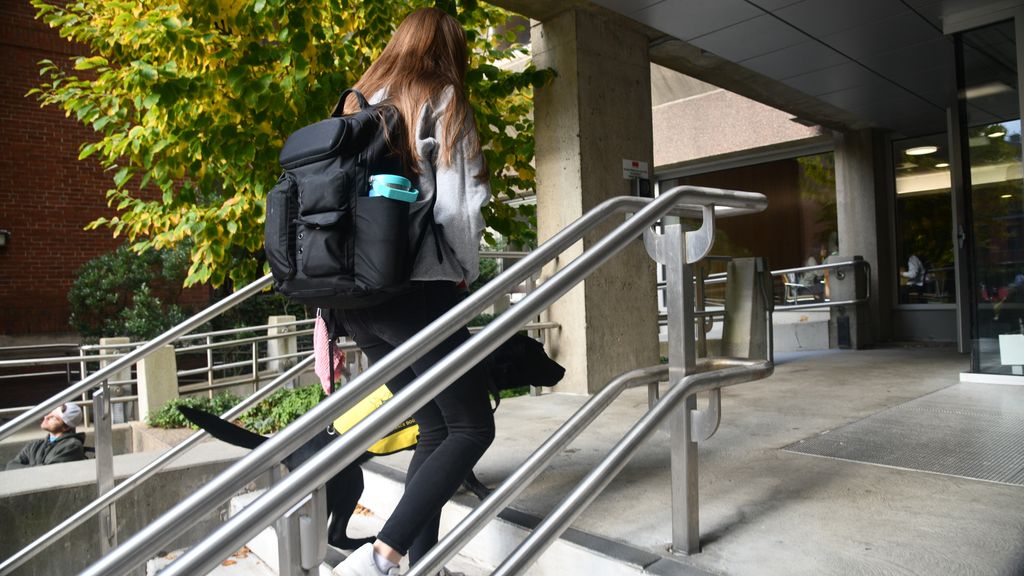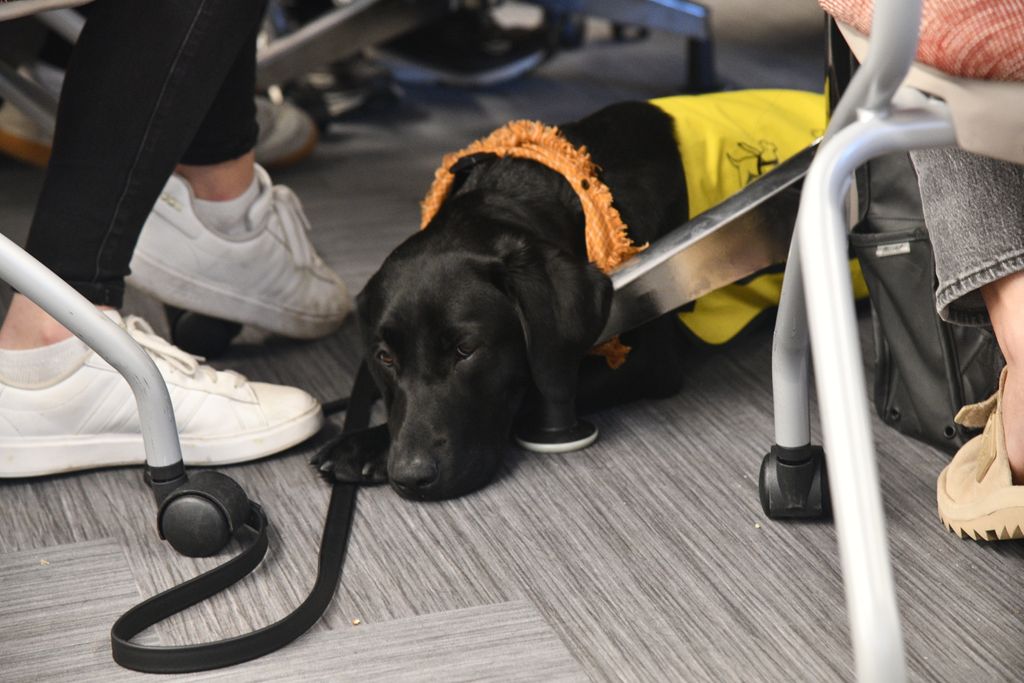Second-year MD Student Raises Future Service Dogs
Dogs have always been part of Alexis Kruger’s life. Growing up in Annapolis, Maryland, her family had German shepherds, a Rottweiler, and Labrador retrievers. By the time she reached high school, she was fostering abandoned and rescued dogs until a new owner was found.
“I probably fostered around 20-25 puppies,” said Kruger, a second-year medical student.
As a first-year undergraduate at the University of Maryland, Kruger discovered America’s VetDogs, which provides service dogs to U.S. veterans, active-duty service members and first responders with disabilities, free of charge.
“They train and place dogs with veterans or first responders with disabilities, both physical and emotional,” said Kruger, including seizure response dogs, hearing dogs, mobility dogs and combat-related Post Traumatic Stress Disorder (PTSD) service dogs.
On its website, America’s VetDogs said it costs more than $50,000 to breed, raise, train, and place one assistance dog. All services are free of charge for the recipient and the not-for-profit organization relies on donations from individuals, corporations, foundations, businesses and community groups.
 As part of her training, Judy accompanies Alexis Kruger everywhere.
As part of her training, Judy accompanies Alexis Kruger everywhere.
Kruger gets a puppy at between 2-3 months old and keeps it to age 16-20 months. She raised three service dogs while as an undergrad and is on her second in medical school.
“Judy loves every person as if they were her long-lost best friend,” said Kruger of her current service dog, a black Labrador retriever. The first four dogs were paired with veterans suffering from PTSD.
Annapolis is home to the U.S. Naval Academy and Kruger has immediate family who served in the military. She founded Student Efforts to Reach Veteran Empowerment (SERVE), a community service group connecting BU medical students with veterans and students serving in the military on topics related to veterans’ health and veterans’ issues.
Kruger majored in psychology at Maryland and was interested in mental health and PTSD.
“PTSD is a psychological condition that is characterized by high levels of anxiety and high levels of depression,” said Terence Keane, PhD, professor of psychiatry and clinical psychology, associate chief of staff for research and development at VA Boston Healthcare System and director of the National Center for Posttraumatic Stress Disorder’s Behavioral Science Division.
That anxiety can present as flashbacks and recurring nightmares related to the traumatic event. Anger, isolation and negative thinking are other reactions.
“Structure is one of the first casualties of PTSD. People are just so internally focused,” said Keane. “Anything that structures people’s lives, like the care of a service animal is good. Getting people up and out of the house, exercising, feeding the dog, all these things add structure.”
“Additionally, there is the love, attention and the affection of the relationship, all of which are probably foreign emotions to a lot of people who are in many ways stuck in their own sense of their trauma, their horror or their fears,” said Keane.
Like many medications, these service dogs work well for some people but not for others, Keane said. The relationship requires updates to training for dog and owner as well as buy-in by the new owner, he added.
 Service dog Judy is trained to wait patiently while in class, on public transit, in restaurants.
Service dog Judy is trained to wait patiently while in class, on public transit, in restaurants.
Kruger and other volunteer puppy raisers provide a valuable intermediate step in the process, training a puppy in the basics while socializing it to being around people in areas that aren’t always welcoming like crowded sidewalks, restaurants and public buildings, public transit, planes and even college classrooms. They must become acclimated to sirens or other loud noises as well. Plus, they can’t chew or damage anything in the house.
It’s a lot to impart in a year, especially for someone with a busy medical school schedule, but Kruger felt she could handle it.
“At that point she’d already raised three and was on her fourth,” said Melissa Harrington, America’s VetDogs puppy program advisor for the DC/Metro area. “Once you have someone who’s outstanding like Lexi, you 100 percent follow anything she says.”
Part of Kruger’s job is to always have Judy with her. They walk the campus, go to class together, run errands, go into restaurants. When she encounters resistance to access for the dog, Kruger feels it is her mission to educate the public on their role and importance.
“I’m very comfortable explaining it to people,” she said.
And Judy gives her life structure as well, bringing her back into the world.
“There are days that I’m sure I would be sitting there at my desk for 12 hours straight studying if I didn’t have this dog that come’s over to me and says, ‘I’d like to go for a walk now,’” Kruger said. While America’s VetDog’s certified service dog instructors ultimately teach service dogs their specific tasks and skills, Kruger does do some rudimentary work. One of her favorite exercises is teach Judy to “rest,” where the dog put its head in her lap and exerts a downward pressure.
“It’s used as a grounding tool for someone who might be having a tough time in public, getting overwhelmed, having panic attacks,” said Kruger. “The dog sits there with you, with his head on your lap, and it’s very calming.”
After spending a year or more with a dog, it is hard to say goodbye.
“It’s always bittersweet giving them up but seeing them go on to do the job that they are trained for is rewarding,” she said. “It’s everything they’ve ever worked for.”